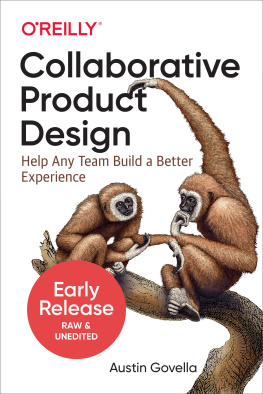Edward Stull - UX Fundamentals for Non-UX Professionals: User Experience Principles for Managers, Writers, Designers, and Developers
Here you can read online Edward Stull - UX Fundamentals for Non-UX Professionals: User Experience Principles for Managers, Writers, Designers, and Developers full text of the book (entire story) in english for free. Download pdf and epub, get meaning, cover and reviews about this ebook. year: 2018, publisher: Apress, genre: Computer. Description of the work, (preface) as well as reviews are available. Best literature library LitArk.com created for fans of good reading and offers a wide selection of genres:
Romance novel
Science fiction
Adventure
Detective
Science
History
Home and family
Prose
Art
Politics
Computer
Non-fiction
Religion
Business
Children
Humor
Choose a favorite category and find really read worthwhile books. Enjoy immersion in the world of imagination, feel the emotions of the characters or learn something new for yourself, make an fascinating discovery.
- Book:UX Fundamentals for Non-UX Professionals: User Experience Principles for Managers, Writers, Designers, and Developers
- Author:
- Publisher:Apress
- Genre:
- Year:2018
- Rating:5 / 5
- Favourites:Add to favourites
- Your mark:
UX Fundamentals for Non-UX Professionals: User Experience Principles for Managers, Writers, Designers, and Developers: summary, description and annotation
We offer to read an annotation, description, summary or preface (depends on what the author of the book "UX Fundamentals for Non-UX Professionals: User Experience Principles for Managers, Writers, Designers, and Developers" wrote himself). If you haven't found the necessary information about the book — write in the comments, we will try to find it.
Demystify UX and its rules, contradictions, and dilemmas. This book provides real-world examples of user experience concepts that empower teams to create compelling products and services, manage social media, interview UX candidates, and oversee product teams.
From product decisions to performance reviews, your ability to participate in discussions about UX has become vital to your companys success as well as your own. However, UX concepts can seem complex. Many UX books are written by and for UX professionals. UX Fundamentals for Non-UX Professionals serves the needs of project managers, graphic designers, copyeditors, marketers, and others who wish to understand UX design and research.
You will discover how UX has influenced history and continues to affect our daily lives. Entertaining real-world examples demonstrate what a massive, WWII-era tank teaches us about design, what a blue flower tells us about audiences, and what drunk marathoners show us about software.
What Youll Learn
- Know the fundamentals of UX through real-world examples
- Acquire the skills to participate intelligently in discussions about UX design and research
- Understand how UX impacts business, including product, pricing, placement, and promotion as well as security, speed, and privacy
Who This Book Is For
Professionals who work alongside UX designers and researchers, including but not limited to: project managers, graphic designers, copyeditors, developers, and human resource professionals; and business, marketing, and computer science students seeking to understand how UX affects human cognition and memory, product pricing and promotion, and software security and privacy.
Edward Stull: author's other books
Who wrote UX Fundamentals for Non-UX Professionals: User Experience Principles for Managers, Writers, Designers, and Developers? Find out the surname, the name of the author of the book and a list of all author's works by series.











